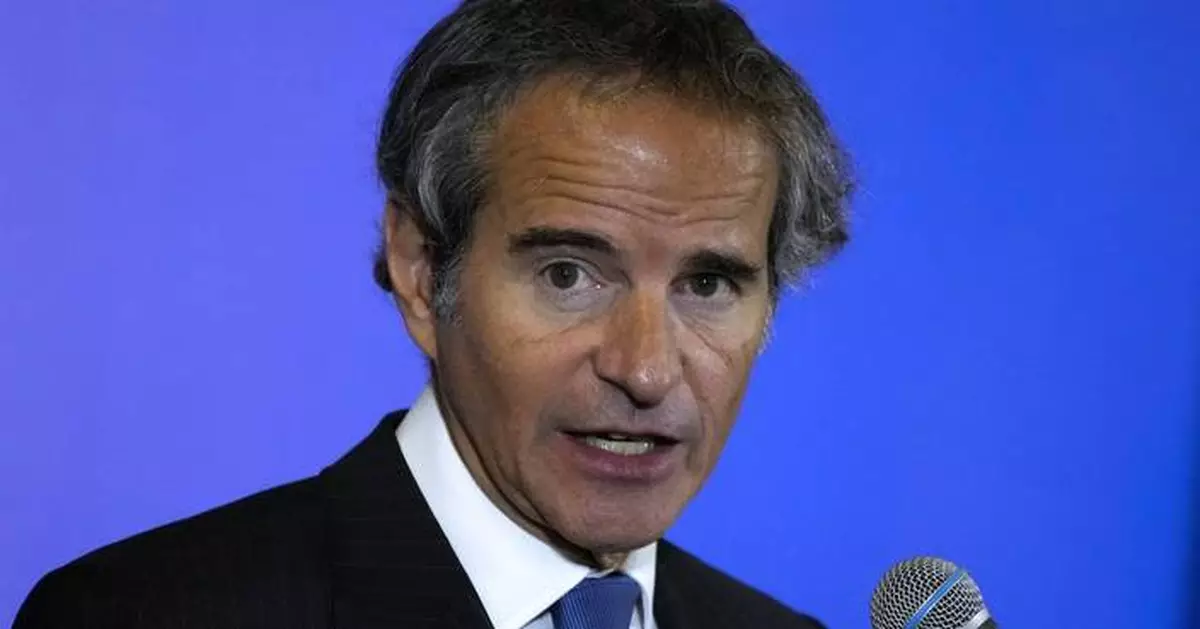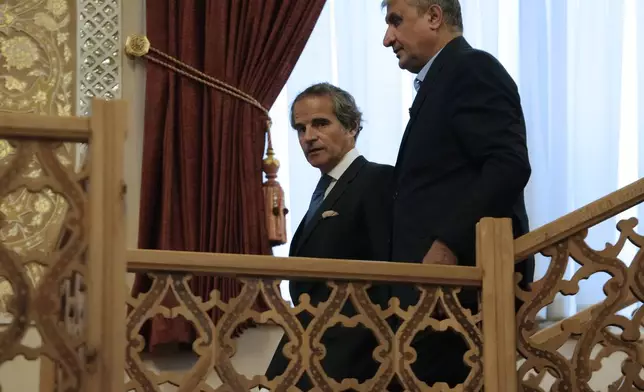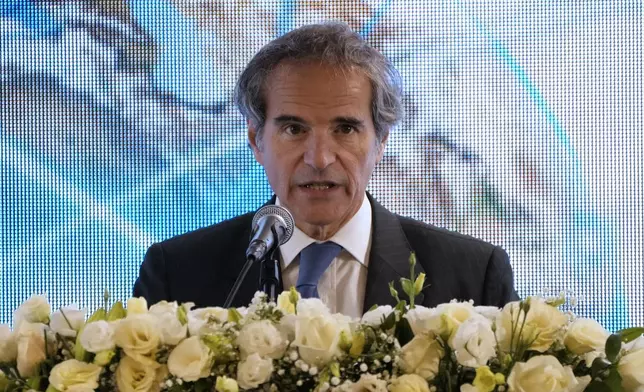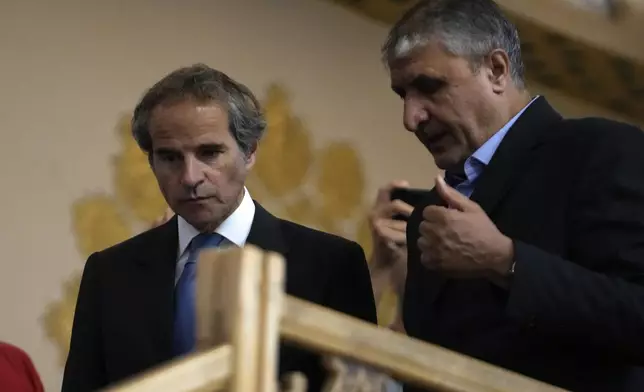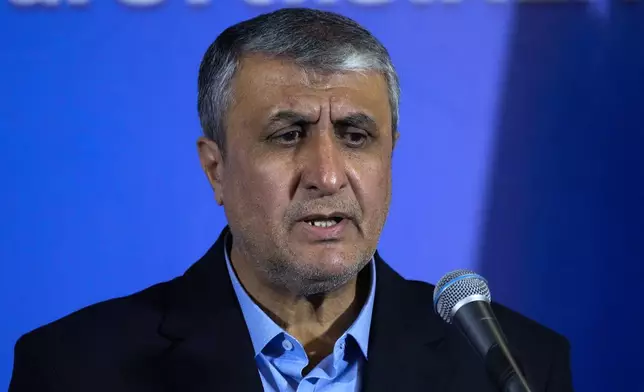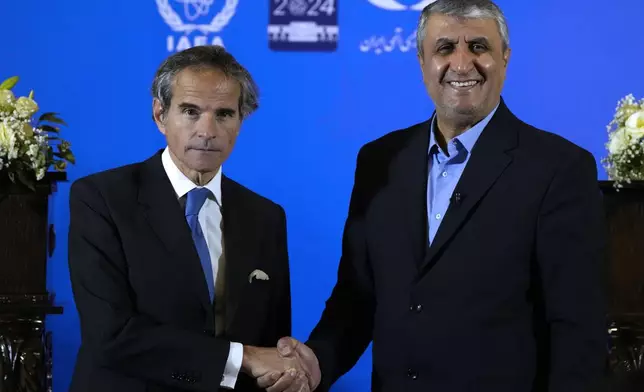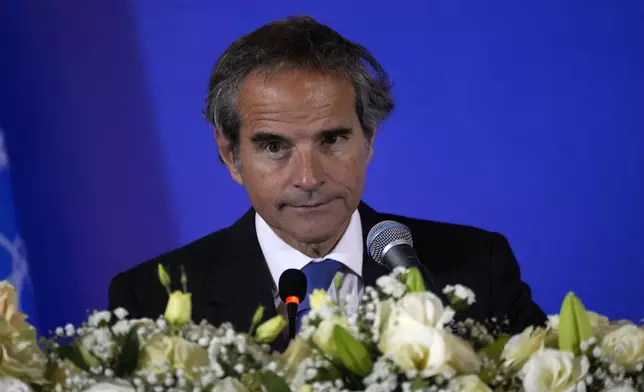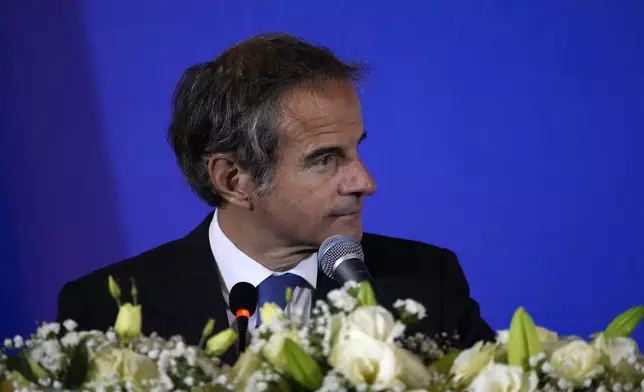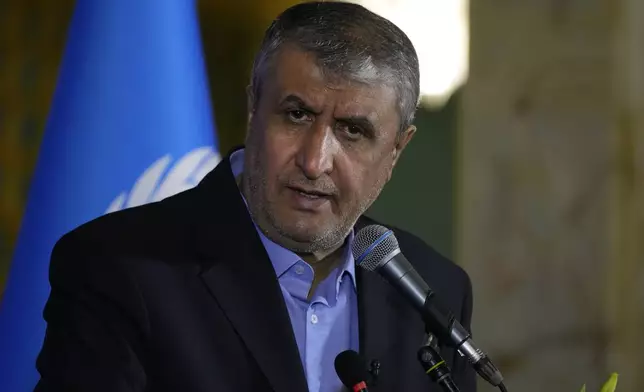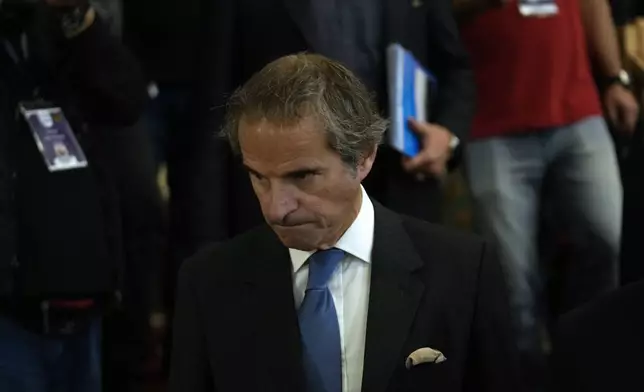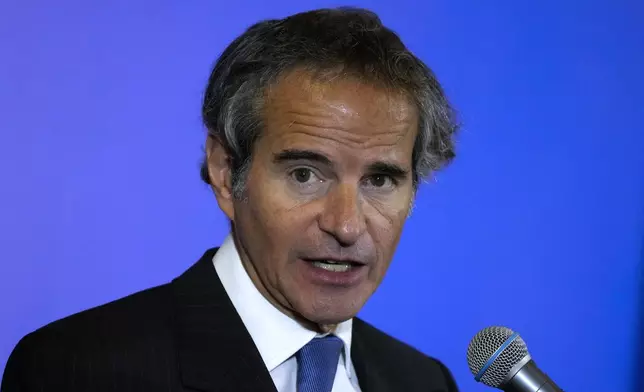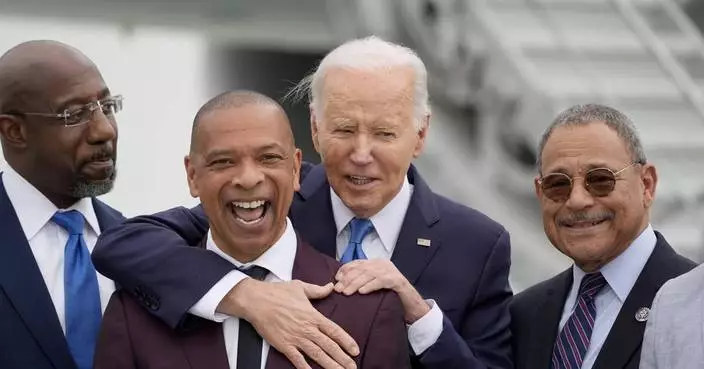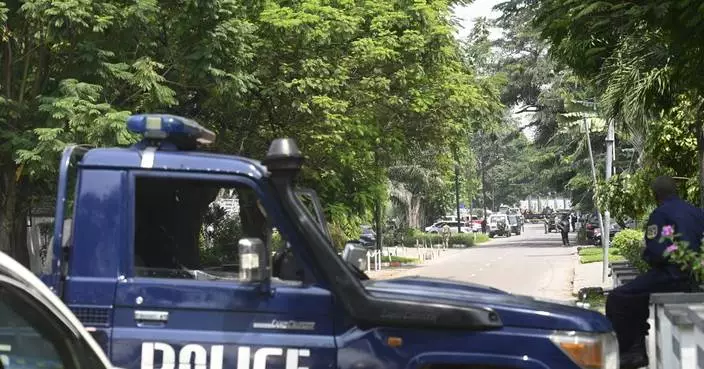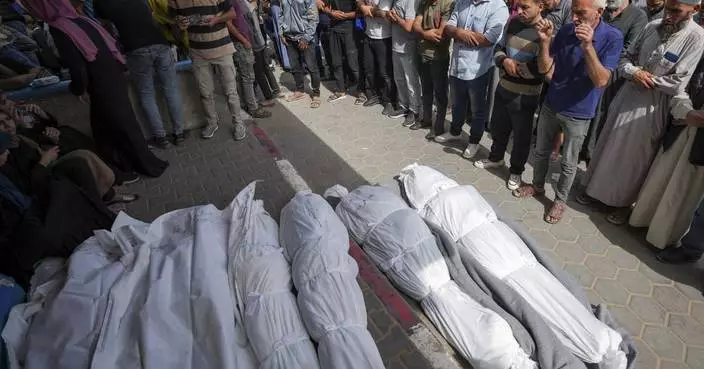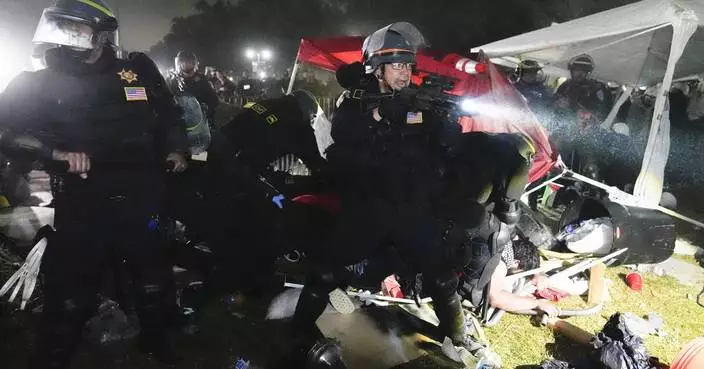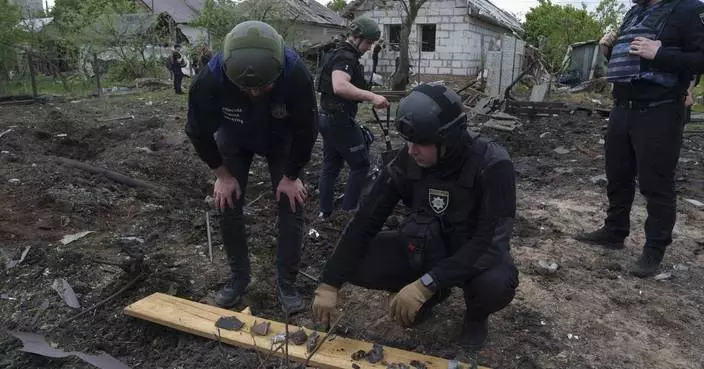JERUSALEM (AP) — Iran and the United Nations' nuclear watchdog are still negotiating over how to implement a deal struck last year to expand inspections of the Islamic Republic's rapidly advancing atomic program, officials said Tuesday.
The acknowledgment by the International Atomic Energy Agency's leader Rafael Mariano Grossi shows the challenges his inspectors face, years after the collapse of Tehran's nuclear deal with world powers and the wider tensions gripping the Mideast over the ongoing Israel-Hamas war.
Meanwhile, Lebanon's Hezbollah militia launched attacks on Israel on Tuesday as Yemen's Houthi rebels were suspected of targeting a commercial ship in the Gulf of Aden.
Grossi has already warned that Tehran has enough uranium enriched to near-weapons-grade levels to make “several” nuclear bombs if it chose to do so. He has acknowledged the agency cannot guarantee that none of Iran’s centrifuges may have been peeled away for clandestine enrichment.
Grossi spoke to journalists at a news conference in the city of Isfahan, alongside Mohammad Eslami, the head of the Atomic Energy Organization of Iran. While both men said there would be no immediate new deal struck during the visit, they pointed to a March 2023 joint statement as a path forward for cooperation between the IAEA and Iran.
That 2023 statement included a pledge by Iran to resolve issues around sites where inspectors have questions about possible undeclared nuclear activity, and to allow the IAEA to “implement further appropriate verification and monitoring activities.”
Grossi and Eslami offered few specifics from the ongoing discussions, though Grossi said technical teams from the two sides were talking over specifics.
“What we are looking at is concrete measures that could make this operational,” Grossi said.
Eslami said: “The important point is that Mr. Grossi takes the necessary actions to settle the problems that are mainly political."
Speaking to reporters later Tuesday in Vienna, Grossi reiterated that the joint statement between Iran and the IAEA agreed in March 2023 was still very much “alive” and that it contained all the necessary points.
“I want results and I want them soon,” Grossi told reporters at Vienna airport. “The present state is completely unsatisfactory,” he said.
Grossi explained that there was no timeframe or deadline agreed on the implementation of the various points but added that he was told by Iranian Foreign Minister Hossein Amirabdollahian that Iran was “ready to engage in very concrete measures.”
He also said that no technical team was left behind in Tehran to continue discussions.
Tensions have grown between Iran and the IAEA since 2018, when then-President Donald Trump unilaterally withdrew the United States from Tehran’s nuclear deal with world powers. Since then, Iran has abandoned all limits the deal put on its program and enriches uranium to up to 60% purity — near weapons-grade levels of 90%.
IAEA surveillance cameras have been disrupted, while Iran has barred some of the agency’s most experienced inspectors. Iranian officials also have increasingly threatened they could pursue atomic weapons.
Meanwhile, tensions between Iran and Israel have hit a new high. Tehran launched an unprecedented drone-and-missile attack on Israel last month, after years of a shadow war between the two countries reached a climax with Israel’s apparent attack on an Iranian consular building in Syria that killed two Iranian generals and others.
Isfahan itself apparently has come under Israeli fire in recent weeks, despite being surrounded by sensitive nuclear sites.
Eslami in his remarks accused Israel of meddling in the relationship between the IAEA and Iran.
“It is important to be careful that the hostile actions against the Islamic Republic of Iran, which the Zionists are source of ... do not affect the interactions between Iran and the agency,” Eslami said. “What is shown in the media is based on the Zionist regime’s manipulations.”
Grossi insisted that the IAEA’s relationship with Tehran is not affected by outside parties.
Elsewhere in the Mideast, Hezbollah claimed multiple explosive drone and rocket attacks on Israel, saying they targeted barracks, Israeli air defenses and other sites. The Israeli military did not immediately comment on those incidents, though it did acknowledge incoming fire targeting Yiftah, some 150 kilometers (90 miles) north of Jerusalem, an attack also claimed by Hezbollah.
The Lebanese Sunni political and militant organization the Islamic Group also claimed targeting an Israeli barracks near Chebaa Farms, a territory captured by Israeli troops from Syria during the 1967 Mideast war. The attacks all came as the Israeli military seized the Rafah border crossing with Egypt in the Gaza Strip as cease-fire negotiations remained on edge.
Also Tuesday, a ship in the Gulf of Aden came under a suspected attack by Yemen's Houthi rebels, the British military's United Kingdom Maritime Trade Operations center said. A captain aboard the vessel “reported two explosions in close proximity” to the ship, the UKMTO said, though the boat and its crew were safe.
The rebels did not immediately claim the attack, but it typically takes them hours to acknowledge their assaults. The Houthis have launched over 50 attacks on shipping since November over the Israel-Hamas war.
The U.S. military's Central Command separately said that it shot down a Houthi drone over the Red Sea on Monday.
Associated Press writers Kareem Chehayeb in Beirut and Stephanie Liechtenstein in Vienna contributed to this report.

International Atomic Energy Organization, IAEA, Director General Rafael Grossi, left, and head of Iran's atomic energy department Mohammad Eslami arrive for a joint press conference after their meeting in the central city of Isfahan, Iran, Tuesday, May 7, 2024. (AP Photo/Vahid Salemi)

International Atomic Energy Organization, IAEA, Director General Rafael Grossi speaks during Iran's "International Conference on Nuclear Science and Technology" in the central city of Isfahan, Iran, Tuesday, May 7, 2024. (AP Photo/Vahid Salemi)

International Atomic Energy Organization, IAEA, Director General Rafael Grossi, left, and head of Iran's atomic energy department Mohammad Eslami arrive for a joint press conference after their meeting in the central city of Isfahan, Iran, Tuesday, May 7, 2024. (AP Photo/Vahid Salemi)

Head of Iran's atomic energy department Mohammad Eslami speaks during his joint press conference with International Atomic Energy Organization, IAEA, Director General Rafael Grossi after their meeting in the central city of Isfahan, Iran, Tuesday, May 7, 2024. (AP Photo/Vahid Salemi)

International Atomic Energy Organization, IAEA, Director General Rafael Grossi, left, and head of Iran's atomic energy department Mohammad Eslami shake hands at the conclusion of their joint press conference after their meeting in the central city of Isfahan, Iran, Tuesday, May 7, 2024. (AP Photo/Vahid Salemi)

International Atomic Energy Organization, IAEA, Director General Rafael Mariano Grossi listens during his joint press conference with head of Iran's atomic energy department Mohammad Eslami after their meeting in the central city of Isfahan, Iran, Tuesday, May 7, 2024. (AP Photo/Vahid Salemi)

International Atomic Energy Organization, IAEA, Director General Rafael Grossi listens during his joint press conference with head of Iran's atomic energy department Mohammad Eslami after their meeting in the central city of Isfahan, Iran, Tuesday, May 7, 2024. (AP Photo/Vahid Salemi)

Head of Iran's atomic energy department Mohammad Eslami speaks during his joint press conference with International Atomic Energy Organization, IAEA, Director General Rafael Grossi after their meeting in the central city of Isfahan, Iran, Tuesday, May 7, 2024. (AP Photo/Vahid Salemi)

International Atomic Energy Organization, IAEA, Director General Rafael Grossi arrives for his joint press conference with head of Iran's atomic energy department Mohammad Eslami after their meeting in the central city of Isfahan, Iran, Tuesday, May 7, 2024. (AP Photo/Vahid Salemi)

International Atomic Energy Organization, IAEA, Director General Rafael Grossi speaks during his joint press conference with head of Iran's atomic energy department Mohammad Eslami after their meeting in the central city of Isfahan, Iran, Tuesday, May 7, 2024. (AP Photo/Vahid Salemi)


